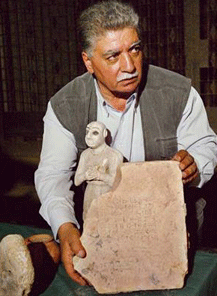
[Donny George at Iraqi exhibition of pre-Islamic antiquties.]
Muslims Need to be Sensitised to their Own Material Past
By Alastair Northedge, The Art Newspaper, November 2006
At the end of August, The Art Newspaper revealed the stunning news that Donny George, president of the State Board of Antiquities and Heritage in Iraq, had been forced to flee the country in fear of his life and take refuge in Damascus. In recent months, Dr George sealed up the treasures of the National Museum in Baghdad behind concrete walls, as it was too dangerous to leave them exposed. He was replaced by a relation of the Minister of Tourism, who comes from the party of Muqtada al-Sadr, the Shia cleric and leader of the resistance movement.
Quite rightly, the world reacted with horror to this new threat to Iraq’s antiquities. No technically competent director is left to protect one of the world’s finest archaeological heritages. A situation with catastrophic potential, such as a new pillage of the museum could take place or objects could be sold off en masse.
It is worth deconstructing this event, in order to understand what has really happened and what the dangers are.
Dr George has worked tirelessly since the invasion in 2003, to protect and recover the antiquities then pillaged from the museum. I have the highest admiration for what he has done. He was and is the right person to interface with Western archaeologists, for the recovery of smuggled artefacts and getting help from Western institutions. I suspect that relations with his own government were by no means so warm. The problem is not that he is a Christian, or that he was a Ba’th party official. In my experience, he did not have a great interest in the Islamic heritage, and no doubt this communicated itself to superiors, whose main interest is indeed Islam.
Frequently, archaeologists in Arab countries follow the role models provided by their Western counterparts. Dr George is one of them. Overwhelmingly, Western archaeologists in the Middle East concentrate on the ancient cultures–Egypt, Mesopotamia, Biblical archaeology, etc.–no doubt seen as the ancestors of their own culture. Medieval Islam is of little interest. In a recent meeting in Paris, intended to relaunch French excavations in Iran, there were 23 ancient expeditions, and one Islamic. Not an untypical example. Many of my colleagues have a genuine goodwill towards more recent studies, but others have no interest at all, and it shows.
It would not be surprising if less well-informed Muslims–I do not speak of the cultivated middle classes, who have a genuine interest in their past–were to see the archaeology of the Middle East as in some way belonging to the foreigners and not to themselves. In some cases, they are right: Hellenism and Rome in the East were colonial
empires. In others they are not; a modern Shi’i Iraqi probably has the DNA of a Babylonian. In addition, of course, Islam has a revolutionary tradition, that is, Islam replaced earlier civilisations which were considered to be decadent. Islam has a high appreciation of Jesus, but his prophecy was succeeded by that of Muhammad.
Islamist governments, that is, governments of people with more or less fundamentalist Islamic opinions, are a fact of life in the Middle East these days. There may be more tomorrow. Some effort has to be made to deal with them, in order to protect the archaeological heritages of the countries they govern. Simply giving up on contact is not an option. The archaeological heritage cannot be replaced once it has disappeared.
The actual activities of an Islamist-type government are in fact variable. The most extreme case was the destruction of the Buddhas of Bamiyan in 2001. In that case, the act seemed to be carried out precisely because there would be an international outcry against it. It was a way of revenging themselves on the West. In the case of the Shi’i administration in Baghdad, and particularly the Sadrists who control the relevant ministry, there have been only words so far. Al-Sadr is alleged to have said that it was acceptable to loot pre-Islamic sites.
But there is little evidence so far of faith-based looting or
destruction in Iraq. Professor Elizabeth Stone of Stonybrook University has said: “What is striking is that the Islamic parts are left alone, whereas the immediate pre-Islamic sites are not.†It is true that there has been little looting of Islamic sites in proportion to ancient sites, but it is a difference that goes back to 1991, and has economic origins. Islamic objects from Iraq are not seen as having the same financial value.
On the other hand, in Iran, an Islamist-type regime has come to terms with its archaeological heritage, and images of the pre-Islamic Iranian past are used again for national
representation.
There is no doubt that Muslims undervalue the uses of archaeology–even of the Islamic period–for proclaiming their identity. Archaeology is more commonly associated with nationalism, and Islam has a more transnational character as a source of identity. In the short term, the interplay of Islam and nationalism needs to be exploited to defend archaeology. In the long term, a concerted effort needs to be made to sensitise Muslim populations to their magnificent archaeological, architectural and artistic heritages. This point needs to be understood even by archaeologists of the ancient world; it is only by sensitisation of Muslims to their own material past, that they will begin to appreciate that the ancient past is also theirs.
Alastair Northedge is professor of Islamic art and architecture at the Université de Paris (Panthéon-Sorbonne)